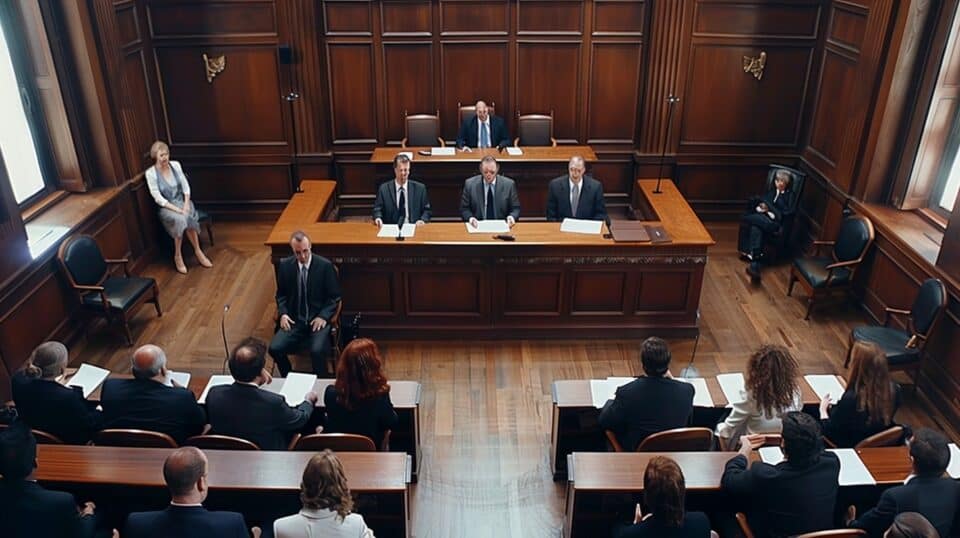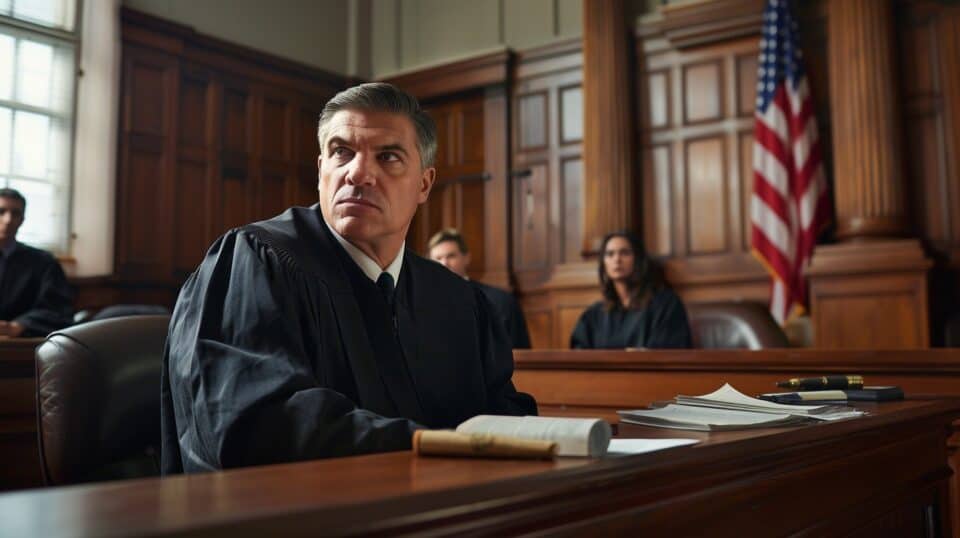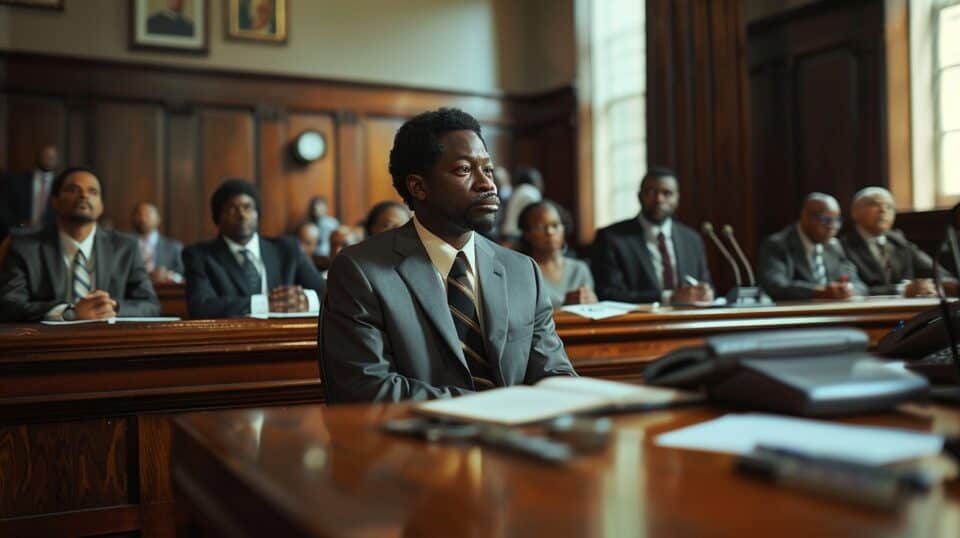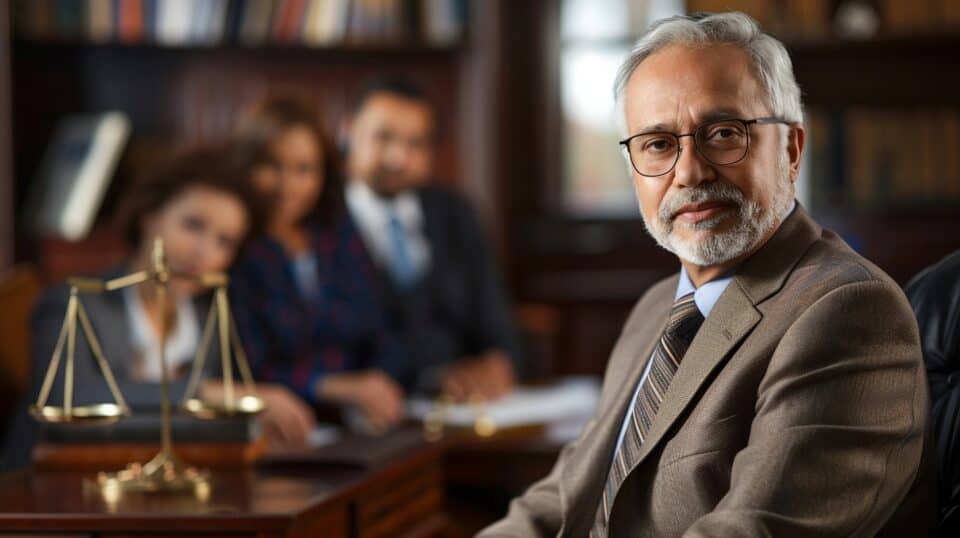Accidents happen. Personal injury attorneys help victims get compensation. 1 This article reveals 8 crucial roles these lawyers play in your case. 3
Discover how they fight for your rights. 2
Key Takeaways
Personal injury attorneys investigate claims, gather evidence, and determine claim value to build strong cases for their clients.
They handle legal procedures like filing complaints, conducting discovery, and managing motions to move cases forward.
These lawyers negotiate with insurance companies and manage settlement proposals to get fair compensation for victims.
They prepare cases for trial and represent clients in court if needed, presenting evidence and arguments to judges and juries.
Personal injury attorneys work on a contingency fee basis, typically charging 33% of the settlement amount, so clients pay nothing upfront.
Table of Contents
Role of a Personal Injury Attorney

Personal injury attorneys fight for victims’ rights. They guide clients through legal mazes and secure fair compensation.
Investigating the Claim
Personal injury attorneys conduct comprehensive claim investigations. They interview witnesses, analyze accident scenes, and review medical records. These lawyers gather crucial evidence to build a strong case for their clients. 1
Thorough investigation is the cornerstone of a successful personal injury claim, according to Rosenthal, Levy, Simon & Sosa.
Evidence collection involves obtaining police reports, security camera footage, and expert opinions. Lawyers test defective products in product liability cases. They also examine medical bills to calculate damages accurately.
This detailed process helps determine liability and claim value. 2
Gathering Evidence
After investigating the claim, personal injury attorneys focus on gathering evidence. This crucial step builds a strong foundation for the case. Lawyers collect witness statements, expert opinions, and other vital information to support their clients’ claims.
Medical records, police reports, and surveillance footage often prove invaluable in establishing liability. 3
Evidence collection extends to financial documentation. Attorneys request bills, records, and economic projections to evaluate damages accurately. They hire medical experts to provide diagnoses, assess future impairments, and discuss the case in detail.
This comprehensive approach equips lawyers with the necessary tools to negotiate effectively with insurance companies and present a compelling case in court if needed. 4
Determining Claim Value
Once evidence is gathered, determining claim value becomes crucial. Personal injury attorneys assess the true worth of a case, factoring in medical expenses, lost income, and future lost wages. 5 They calculate three types of damages: special, general, and punitive. Special damages cover financial losses like medical bills and property repairs. General damages address non-economic impacts such as pain and suffering or loss of enjoyment of life. 2 Skilled lawyers use their expertise to accurately value claims, ensuring clients receive fair compensation for their injuries.
Legal Procedures in Personal Injury Cases

Legal procedures in personal injury cases can be complex. They involve specific steps and timelines that must be followed to ensure a valid claim.
Filing Legal Complaints
Filing legal complaints kicks off the formal process in personal injury cases. A personal injury lawyer drafts a detailed document outlining the incident, injuries sustained, and damages sought.
This complaint gets filed with the appropriate court, officially starting the lawsuit. 5 The defendant then has a set time to respond, usually 20 to 30 days. Proper filing is crucial – errors can lead to case dismissal.
After filing, the discovery phase begins where both sides gather evidence. 1
Conducting the Discovery Phase
After filing legal complaints, personal injury attorneys begin the discovery phase. This crucial step reveals vital case information. Lawyers use interrogatories to obtain detailed accounts from all parties.
These written questions clarify the other side’s version of events. 6
Face-to-face depositions occur under oath. Attorneys gather information directly from witnesses and involved parties. Document production plays a key role too. Lawyers request relevant records such as medical files, police reports, and insurance documents.
This process establishes a strong foundation for the case, helping attorneys develop effective strategies for their clients. 7
Managing Legal Motions
Following the discovery phase, attorneys focus on managing legal motions. This crucial step shapes the trajectory of a personal injury case.
Legal motions play a pivotal role in resolving disputes before trial. Attorneys file motions to dismiss, compel evidence, or exclude experts. Judges decide these motions at hearings or later dates. 8 Successful motions can significantly impact case outcomes. For example, a granted motion to dismiss ends the lawsuit entirely. Effective motion practice requires strong legal arguments and persuasive oral presentations.
A well-crafted motion can turn the tide of a case. 9
Negotiation and Settlement Strategies

Personal injury attorneys fight for fair settlements through tough talks with insurance companies… Want to know more about their strategies?
Negotiating with Insurers
Personal injury lawyers engage with insurance companies to secure fair compensation for their clients. These legal professionals utilize their expertise in negotiation tactics and legal doctrines to maximize claim potential. 10 Insurers often offer low initial offers, but skilled attorneys respond assertively. They present compelling evidence, calculate damages thoroughly, and advocate for every dollar their client deserves.
Effective negotiators understand how to counter common insurance company tactics. They’re prepared for delay tactics, denial of liability claims, and attempts to shift blame. 11 Lawyers use assertive communication, supported by solid case facts, to keep negotiations on track.
Their goal is to reach a settlement that fully covers economic and non-economic damages without going to trial. In the following section, we’ll explore how attorneys manage settlement proposals to benefit their clients.
Managing Settlement Proposals
Managing settlement proposals requires a keen eye and strategic thinking. Lawyers assess offers, considering medical bills, lost wages, and pain suffering. They compare proposals to similar cases, ensuring fair compensation.
A skilled attorney pushes back on low-ball offers, armed with evidence and legal precedents. 10 They may counter with higher figures, backed by expert testimonies and detailed injury reports.
Negotiation tactics play a crucial role in securing better outcomes. Attorneys use mediation to find middle ground, often resulting in quicker resolutions. 12 They address disputes over injury severity or fault head-on, presenting clear evidence to support their client’s claim.
This approach helps overcome common reasons for low offers, leading to more favorable settlements for accident victims.
Preparing for and Representing at Trial

Personal injury attorneys thoroughly prepare for trial, collecting evidence and developing persuasive arguments to present in court. Are you interested in learning more about how they advocate for your rights?
Preparing Case for Trial
Attorneys thoroughly prepare cases for trial to ensure the best possible outcome for their clients. This process involves several crucial steps:
- Gather and organize evidence: Collect police reports, medical records, witness statements, and expert testimonies. 13
- Develop trial strategy: Create a compelling narrative that supports the client’s claim and addresses potential weaknesses.
- File pre-trial motions: Submit requests to exclude certain evidence or dismiss parts of the opposing party’s case.
- Prepare witnesses: Guide clients and witnesses on courtroom procedures and potential cross-examination questions.
- Create visual aids: Design charts, diagrams, or 3D models to illustrate complex concepts for the jury.
- Draft opening and closing statements: Compose persuasive arguments that frame the case and summarize key points.
- Anticipate opposing arguments: Develop counterarguments and prepare rebuttals to the defense’s potential strategies.
- Conduct mock trials: Practice presenting the case to simulate courtroom conditions and refine presentation skills. 14
- Arrange expert witnesses: Secure testimony from specialists to support medical claims or accident reconstructions.
- Review jury selection strategy: Develop questions to identify favorable jurors and challenge potentially biased ones.
Representing Clients in Court
In court, personal injury attorneys become fierce advocates for their clients. They present evidence, cross-examine witnesses, and deliver compelling arguments to judges and juries. 15 These legal professionals craft persuasive opening and closing statements, aiming to secure the best possible outcome for those they represent.
Personal injury lawyers must stay sharp and adaptable during trials. They object to improper evidence, respond to opposing counsel’s tactics, and adjust strategies as new information emerges.
The next crucial role involves managing settlement proposals effectively. 2
Common Personal Injury Cases

Personal injury attorneys tackle a wide range of cases – from fender benders to workplace mishaps. Want to know more? Keep reading!
Handling Auto Accident Claims
Auto accident claims demand swift action. A skilled personal injury attorney gathers crucial evidence, like police reports and medical records. 16 They communicate with insurance companies, protecting clients from unfair tactics.
These lawyers assess damages, including medical bills, lost wages, and pain and suffering. They negotiate settlements, aiming for fair compensation without court intervention.
Lawsuits may be necessary if negotiations fail. Attorneys file within the two-year statute of limitations in Houston, TX. They guide clients through legal proceedings, representing them in court if needed.
Expert witnesses, such as accident reconstructionists or economists, strengthen cases. Lawyers fight for rightful compensation, covering both economic and non-economic losses from the accident. 17
Managing Slip and Fall Cases
Slip and fall cases require proving negligence and establishing fault. Personal injury attorneys gather critical evidence like security footage, maintenance records, and witness statements. 18 They assess factors such as duty of care, causation, and extent of injuries to build a strong claim. In Washington state, over 30% of seniors experience unexpected falls annually.
These incidents account for 49% of injury-related deaths in people 60 and older. Lawyers use this data to highlight the serious nature of slip and fall accidents, especially for vulnerable populations.
Next, we’ll explore how personal injury attorneys handle compensation and damages in these cases. 19
Addressing Medical Malpractice
From slip and fall cases, we move to a more serious area of personal injury law: medical malpractice. Personal injury attorneys tackle complex medical malpractice cases, protecting patients’ rights when healthcare providers fail to meet standards of care.
These lawyers navigate the intricate world of medical negligence, where damages can include both economic losses and non-economic factors like pain and suffering. 20 U.S. physicians typically carry malpractice insurance to safeguard against unintentional injuries. 20 Personal injury attorneys must act swiftly, as each state sets specific time limits for filing medical negligence claims. They work with medical assistants and experts to build strong cases, aiming to secure fair compensation for victims of healthcare errors. 15
Compensation and Damages in Personal Injury Law

Personal injury cases can lead to various types of compensation. Victims may receive money for medical bills, lost wages, and pain and suffering.
Types of Financial Compensation
Financial compensation in personal injury cases falls into three main categories: general, special, and punitive damages. 22 Special damages cover tangible losses – medical bills, lost wages, and property repairs.
General damages address non-economic impacts like pain, suffering, and loss of life enjoyment. Punitive damages, less common, aim to punish egregious behavior.
Courts award these compensations based on claim specifics. Medical expenses, both current and future, factor heavily. Lost income and earning capacity play crucial roles. Property damage, emotional distress, and loss of companionship also influence final settlements.
Insurers often negotiate these amounts before trials begin. 21
Calculating Claim Damages
After determining the types of financial compensation, calculating claim damages becomes crucial. Personal injury attorneys use specific formulas and methods to quantify losses. Economic damages, like medical bills and lost wages, are tallied up precisely.
Non-economic damages, such as pain and suffering, require more nuanced calculations. 23
Attorneys consider factors like injury severity, long-term impact, and comparative negligence. They also factor in insurance policy limits. Experienced lawyers use their knowledge of past case outcomes to estimate fair compensation.
This process ensures clients receive appropriate reimbursement for their injuries and losses. 24
The Contingency Fee Basis for Personal Injury Lawyers

Personal injury lawyers typically operate on a contingency fee basis. This fee structure means clients pay nothing upfront – the attorney’s payment comes from a percentage of the settlement or court award.
Most firms charge 33% of the compensation, though rates can range from 25% to 35%. 25 Fran Haasch Law Group and Dolman Law Group offer this arrangement, promising “no recovery, no fee.” 26 This system allows injured parties to access legal representation without financial risk.
People Also Ask
What’s a personal injury attorney’s main job?
A personal injury attorney handles legal claims for injuries. They help victims of car accidents, work mishaps, and other incidents. Their goal? To get fair compensation for their clients.
How do personal injury lawyers charge?
Most work on a contingency basis. This means no upfront fees. They get paid only if you win your case. Their fee is a percentage of your settlement or court award.
What types of cases do these attorneys handle?
They tackle various cases… from traffic accidents to wrongful death claims. Product liability, workplace injuries, and intentional torts fall under their expertise too.
Do personal injury attorneys always go to court?
Not always. They often settle cases out of court through negotiation or alternative dispute resolution. But if needed, they’re ready to fight for you in civil court.
How do personal injury lawyers help with insurance issues?
These attorneys deal with insurance carriers daily. They navigate complex policies, handle uninsured motorist claims, and fight for fair settlements from stubborn insurers.
What’s the difference between a personal injury lawyer and other attorneys?
Personal injury attorneys specialize in tort law. They focus on cases involving injuries and damages. Unlike criminal lawyers, they deal with civil cases and seek compensation, not punishment.
References
^ https://hlalawfirm.com/the-role-of-a-personal-injury-lawyer-key-responsibilities-and-expertise/ (2023-10-16)
^ https://www.conradattorneys.com/blog/what-is-a-personal-injury-lawyer/
^ https://hhjtrialattorneys.com/personal-injury-lawyer-responsibilities/ (2021-01-21)
^ https://www.sanchezandpinon.com/the-role-of-evidence-in-personal-injury-cases-gathering-and-presenting-information/ (2023-10-19)
^ https://www.clio.com/resources/personal-injury-for-lawyers/what-does-a-personal-injury-lawyer-do/
^ https://www.charbonnetlawfirm.com/personal-injury-attorney/discovery-process-personal-injury-lawsuit/ (2023-06-14)
^ https://garmolaw.com/understanding-the-discovery-process-in-a-personal-injury-case/ (2021-04-13)
^ https://www.greenspunlaw.com/faqs/motions-that-may-be-filed-in-personal-injury-cases.cfm
^ https://battafulkerson.com/8-steps-of-a-personal-injury-lawsuit/
^ https://wolfgramlaw.com/personal-injury/how-lawyers-negotiate-settlements/ (2024-04-22)
^ https://www.nolo.com/legal-encyclopedia/how-the-negotiation-process-works-injury-case.html
^ https://www.brownandcrouppen.com/blog/how-do-lawyers-negotiate-settlements/
^ https://1800lionlaw.com/role-of-expert-witnesses-in-a-personal-injury-case/
^ https://oelawyers.com/blog/how-your-personal-injury-attorney-will-prepare-for-trial/
^ https://kalamaya.law/what-does-a-personal-injury-attorney-do-and-how-can-they-help-you/
^ https://www.thorntonesquirelawgroup.com/understanding-the-role-of-a-personal-injury-attorney-in-texas.html
^ https://www.ncbi.nlm.nih.gov/pmc/articles/PMC7135282/
^ https://robertsjoneslaw.com/the-role-of-a-personal-injury-lawyer-in-slip-and-fall-cases/ (2023-09-20)
^ https://peoplefirstlawyers.com/the-ultimate-guide-to-personal-injury-law-in-new-jersey/
^ https://www.ncbi.nlm.nih.gov/pmc/articles/PMC2628513/
^ https://www.bestlawyers.com/article/hiring-personal-injury-lawyer/5200 (2023-04-11)
^ https://1800lionlaw.com/types-of-damages-in-personal-injury-cases/
^ https://aclawfl.com/blog/calculating-damages-in-a-personal-injury-claim/
^ https://yoshalawfirm.com/blog/calculating-damages-in-personal-injury-lawsuit/
^ https://www.1800thelaw2.com/resources/personal-injury/how-do-contingency-fees-work-in-personal-injury-cases/ (2022-11-18)
^ https://www.lorenzandlorenz.com/blog/what-is-a-contingency-fee/




Hi I was fired yesterday because they said I didn’t do what I was trained to do when changing a propane tank and I have burns all over my hands right and left hand please help me